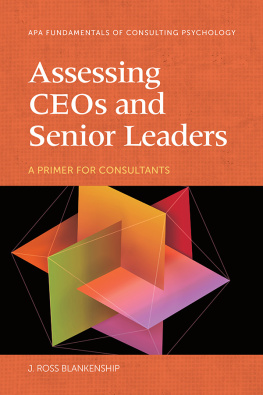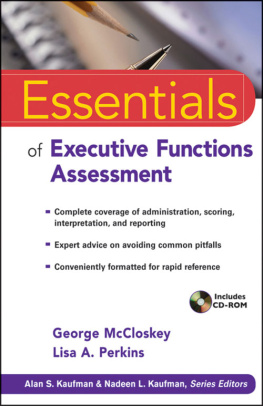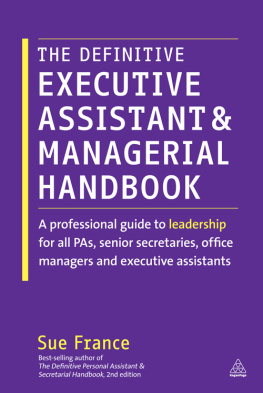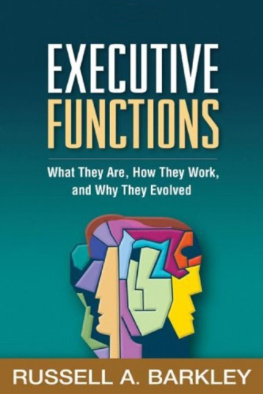Fundamentals of Consulting Psychology Book Series
An Introduction to Consulting Psychology: Working With Individuals, Groups, and Organizations
Rodney L. Lowman
Assessing CEOs and Senior Leaders: A Primer for Consultants
J. Ross Blankenship
Consulting Psychology in National Security Organizations
Laurie B. Moret and Carroll H. Greene III
The Ethical Practice of Consulting Psychology
Rodney L. Lowman and Stewart E. Cooper
Learning Interventions for Consultants: Building the Talent That Drives Business
Manuel London and Thomas Diamante
Transcultural Competence: Navigating Cultural Differences in the Global Community
Jerry Glover and Harris L. Friedman
Using Feedback in Organizational Consulting
Jane Brodie Gregory and Paul E. Levy
Copyright 2022 by the American Psychological Association. All rights reserved. Except as permitted under the United States Copyright Act of 1976, no part of this publication may be reproduced or distributed in any form or by any means, including, but not limited to, the process of scanning and digitization, or stored in a database or retrieval system, without the prior written permission of the publisher.
Electronic edition published 2022.
ISBN: 978-1-4338-3811-8 (electronic edition).
The opinions and statements published are the responsibility of the author, and such opinions and statements do not necessarily represent the policies of the American Psychological Association.
Published by
American Psychological Association
750 First Street, NE
Washington, DC 20002
https://www.apa.org
Order Department
https://www.apa.org/pubs/books
In the U.K., Europe, Africa, and the Middle East, copies may be ordered from Eurospan
https://www.eurospanbookstore.com/apa
Cover Designer: Debra Naylor, Naylor Design, Inc., Washington, DC
Library of Congress Cataloging-in-Publication Data
Names: Blankenship, J. Ross, author.
Title: Assessing CEOs and senior leaders : a primer for consultants / by J. Ross Blankenship.
Description: Washington, DC : American Psychological Association, [2022] | Series: Fundamentals of consulting psychology book series | Includes bibliographical references.
Identifiers: LCCN 2021018986 (print) | LCCN 2021018987 (ebook) | ISBN 9781433837166 (paperback) | ISBN 9781433838118 (ebook)
Subjects: LCSH: ExecutivesRating of. | Chief executive officers. | Business consultants. | BISAC: PSYCHOLOGY / Industrial & Organizational Psychology | BUSINESS & ECONOMICS / Leadership
Classification: LCC HF5549.5.R3 B55 2022 (print) | LCC HF5549.5.R3 (ebook) | DDC 658.4/07125dc23
LC record available at https://lccn.loc.gov/2021018986
LC ebook record available at https://lccn.loc.gov/2021018987
https://doi.org/10.1037/0000264-000
10 9 8 7 6 5 4 3 2 1
Series Editors Foreword
Rodney L. Lowman
T he field of consulting psychology has blossomed in recent years. It covers the applications of psychology in consultation to organizations and systems, but also at the individual and team level. Unfortunately, there are few graduate training programs in this field of specialization, so consulting psychology roles are mostly populated by those who came to the field after having trained in other areas of psychologyincluding industrial and organizational (I/O), clinical/counseling, and school psychology, among others. Such training is rarely focused on consulting psychology and psychologists, and graduate students have to learn through on-the-job training, reading books and articles, attending conferences and workshops, and being mentored in the foundational competencies of the field as they seek to transition into it.
After a number of years of editing Consulting Psychology Journal: Practice and Research, the fields flagship journal, I felt that an additional type of educational product was needed to help those transitioning into consulting psychology. The Society of Consulting Psychology therefore partnered with the American Psychological Association to create a new book series. The idea was to create a series of monographs on specific fundamental skill sets needed to practice in this area of specialization. The goal of the editorial advisory board, consisting of Drs. Judith Blanton, Brodie Gregory, Skipton Leonard (and initially Dale Fuqua and the late Edward Pavur, Jr.) and myself, for this book series has been to identify the major competencies needed by consulting psychologists and then to work with expert authors to create short, accessible but evidence-based texts that would be useful both as standalone volumes and in combination with one another. The readers would be graduate students in relevant training programs, psychologists planning a transition into consulting psychology, and practicing professionals who want to add to their areas of expertise.
What constitutes fundamental skills in consulting psychology? The second edition of the Guidelines for Education and Training at the Doctoral and Postdoctoral Level In Consulting Psychology (CP)/Organizational Consulting Psychology (OCP), approved by APA Council of Representatives in 2017, created by the Society of Consulting Psychology, and approved by the American Psychological Association (2017b); the Handbook of Organizational Consulting Psychology (Lowman, 2002), and An Introduction to Consulting Psychology: Working with Individuals, Groups, and Organizations (Lowman, 2016) provide useful starting points. Each of these contributions was organized around the concept of levels (individual, group, and organizational) as a taxonomy for identifying fundamental skills. Within those categories, two broad skill sets are needed: assessment and intervention.
As with many areas of psychological practice, the foundational skills that apply in one area may overlap into others in the taxonomy. Interventions with individuals, as in executive coaching for instance, usually take place in the context of the focal clients work with a specific team and within a specific organization, which itself may also constitute a client. Understanding the system-wide issues and dynamics at the organizational level usually also involves work with specific executives and teams, and multicultural and international issues suffuse all of our roles. The APA Guidelines and the Handbook concluded, properly, that consulting psychologists should be trained in and have, at least, foundational skills and experience at the individual, group, and organizational levels, even if they primarily specialize in one of these areas.
In inviting you to learn more about consulting psychology through this book series, I hope you will come to agree that there is no more exciting or inherently interesting area of study today than consulting psychology. The series aims not just to cover relevant literature on timeless topics in consulting psychology but also to capture the richness of this work by including case material that illustrates its applications. Readers will soon understand that consulting psychologists are real-world activists, unafraid to work in real-world environments.












